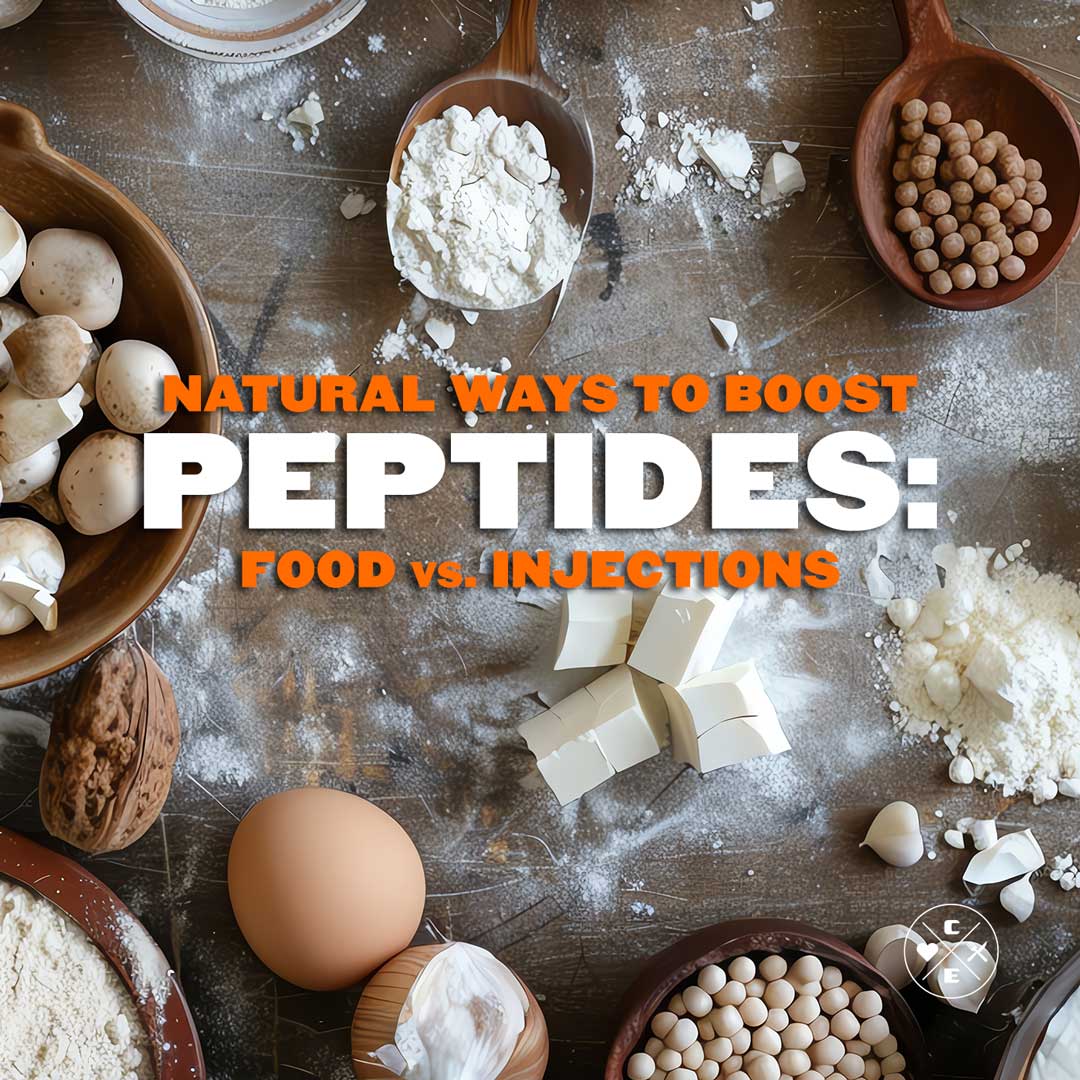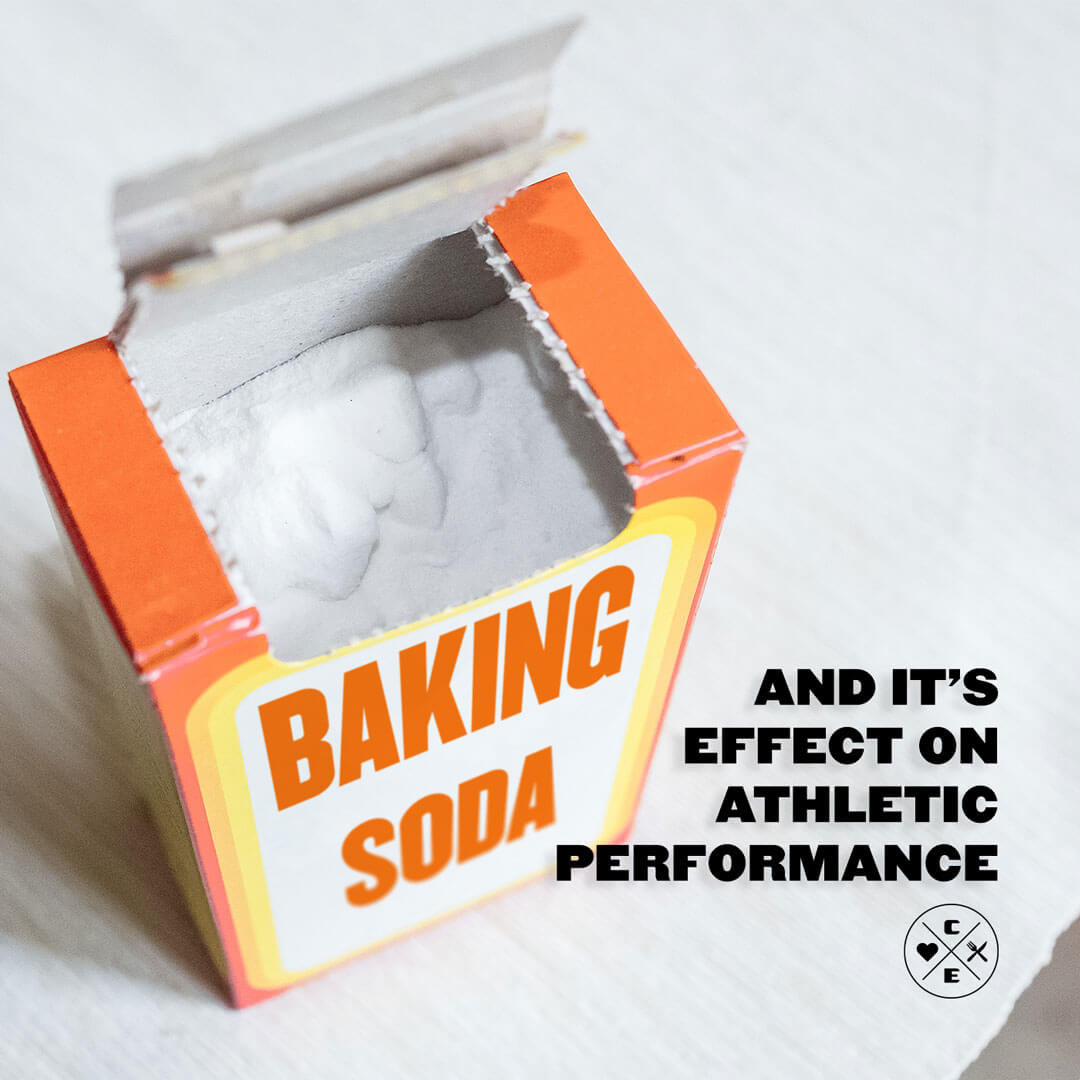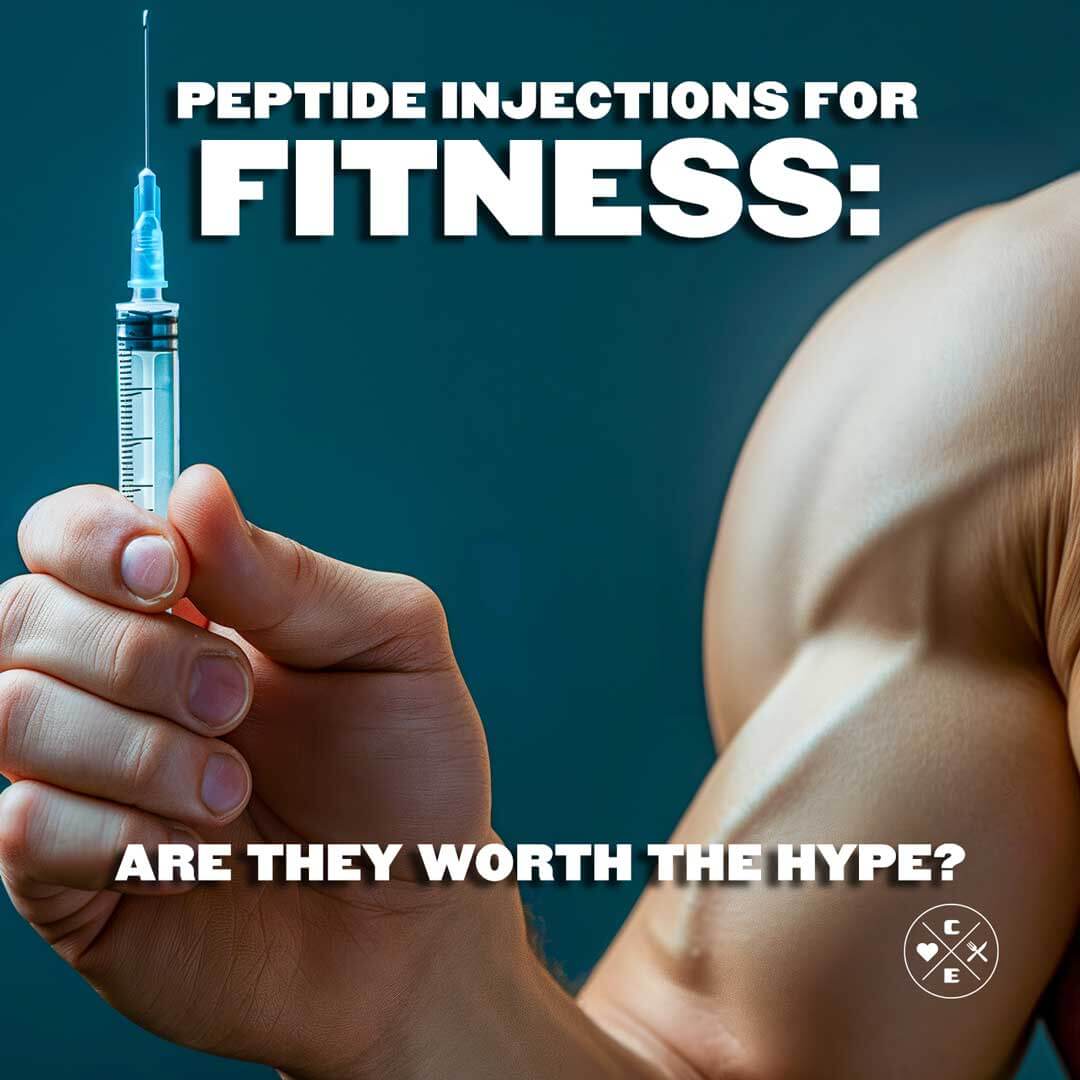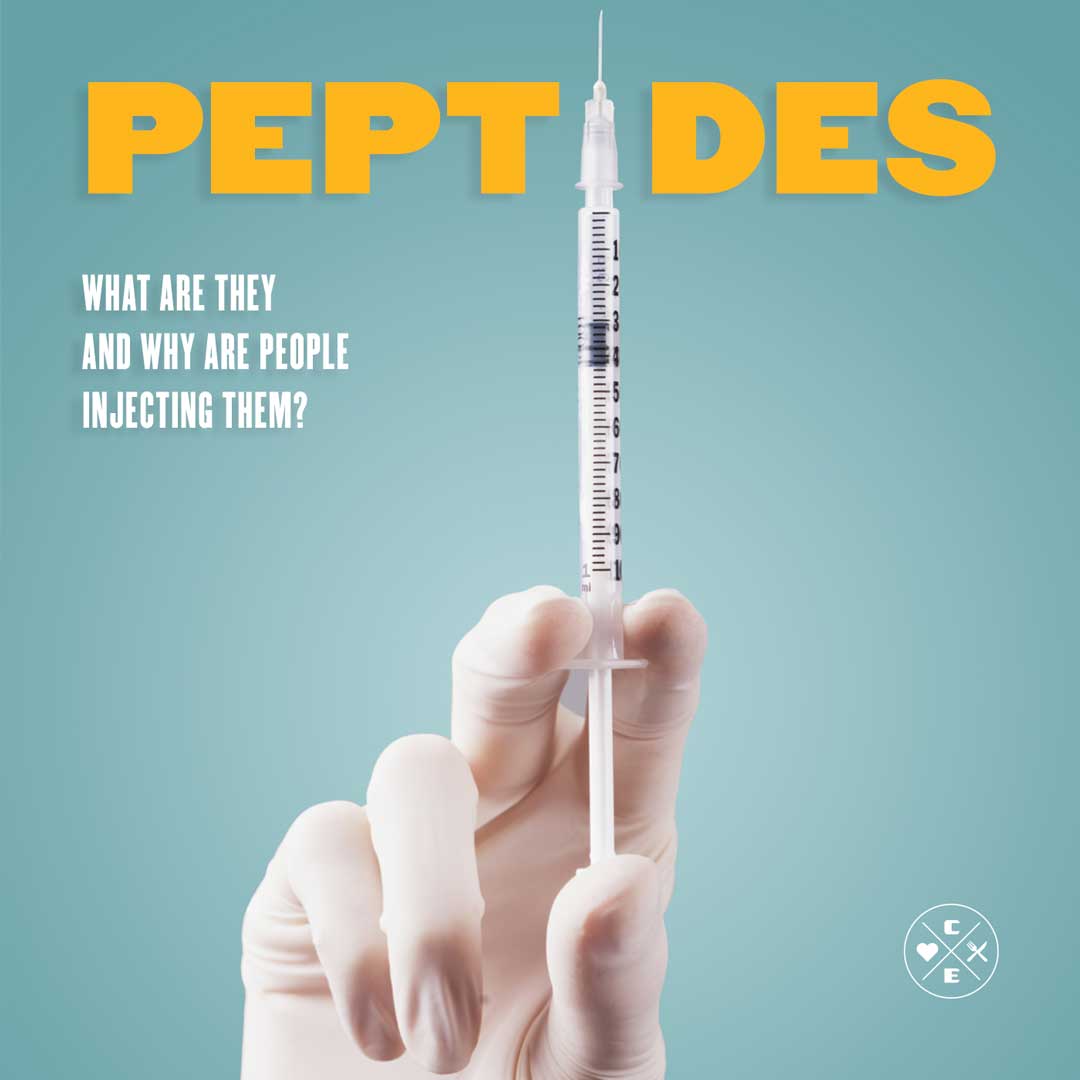
Natural Ways to Boost Peptides: Food vs. Injections
Dorothy M. Shirnyl, RND
Nutrition
|
Exercises & Fitness
|
Healthy Lifestyle
13 minute read
Peptides have gained a lot of attention lately, with claims of everything from anti-aging benefits to muscle growth, improved metabolism, and overall health optimization. But as interest grows, so does the question: what’s the best way to naturally boost your peptides—through the food you eat, or by turning to injections?
As interest in peptides grows, many people wonder: is it better to naturally boost peptides through diet or by using injections? To make the right choice for your health, it's essential to consider the benefits and drawbacks of each approach. Below, we break down the advantages and disadvantages of each approach in detail.
Here’s an overview of this article:
- What Are Peptides?
- How Peptide Levels Naturally Decline
- Natural Food Sources That Support Peptide Production
- Lifestyle Factors that Support Natural Peptide Production
- Peptide Injections: What They Are and How They Work
- Food-Based Peptides vs. Injection-Based Peptide
What Are Peptides?
Simply put, peptides are short chains of amino acids that play a crucial role in our bodies, acting as messengers and regulating different biological functions. They support skin health, muscle development, hormone balance, and even cognitive function.
The common peptides include collagen peptides, which help improve skin elasticity and joint support, and growth hormone-releasing peptides (GHRP), known for boosting muscle growth and reducing signs of aging.
To achieve these benefits, it is crucial to maintain balanced peptide levels, as they support overall health, aid in recovery, and enhance physical performance.
How Peptide Levels Naturally Decline
Peptide levels naturally decline over time due to a variety of factors, which include:
- Aging. As we age, our bodies gradually produce fewer peptides. This decline is linked to several factors, including a reduction in growth hormone, which directly impacts the synthesis of many vital peptides. This reduction can lead to decreased collagen production, resulting in wrinkles, sagging skin, and joint problems. Additionally, aging can impair muscle protein synthesis, contributing to age-related muscle loss and reduced strength.
- Chronic Stress. Prolonged stress leads to elevated cortisol levels, a hormone that can significantly hinder peptide production. Cortisol interferes with various physiological processes, including those involved in tissue repair, immune function, and gut health. For example, chronic stress can impair wound healing, disrupt the gut microbiome (which influences peptide production), and even contribute to hormonal imbalances.
- Environmental Influences. Exposure to environmental pollutants and toxins can also disrupt peptide synthesis. Heavy metals, pesticides, and air pollution can all interfere with the body's ability to produce and utilize peptides effectively. These toxins can disrupt the endocrine system, a complex network of glands and hormones that plays a crucial role in regulating peptide production. Furthermore, lifestyle choices like smoking and excessive alcohol consumption can further hinder peptide synthesis.
- Nutritional Deficiencies. A diet lacking in protein and essential amino acids can directly limit the body's capacity to produce peptides. Specific deficiencies can also play a role. For example, insufficient vitamin C intake can impair collagen synthesis, while a lack of zinc can disrupt enzymatic processes involved in peptide production.
- Lack of Sleep. Sleep deprivation can disrupt hormone balance and affect various physiological processes, including peptide production. When we don't get enough sleep, our bodies may not be able to synthesize peptides efficiently, impacting overall health and well-being.
Natural Food Sources That Support Peptide Production
Boosting peptides naturally through diet is an appealing option, as it relies on providing the body with the necessary building blocks for it to produce its own peptides. Here are some foods that can help:
High Proteins
- Eggs. Eggs are rich in high-quality protein, making them excellent for providing the amino acids needed for peptide production.
- Fish. Fatty fish, like salmon and tuna, not only provide protein but also contain healthy omega-3 fats, which promote overall bodily functions and support peptide activity.
- Legumes. Lentils, chickpeas, and beans are plant-based protein sources that help supply amino acids essential for peptide synthesis.
- Collagen-rich Foods. Bone broth and gelatin are packed with collagen peptides, which can be directly beneficial for skin elasticity and joint health.
- Nuts and Seeds. Foods like pumpkin seeds, chia seeds, and almonds contain both protein and other nutrients that assist the body in producing peptides.
- Collagen-Boosting Foods: Citrus fruits, rich in Vitamin C, and leafy greens help boost collagen production, which supports overall peptide health.
Incorporating these foods into your daily diet can help maintain and improve peptide levels.
Natural Food Sources That Support Peptide Production
Boosting peptides naturally through diet is an appealing option, as it relies on providing the body with the necessary building blocks for it to produce its own peptides. Here are some foods that can help:
High-Quality Proteins
- Eggs. Eggs are rich in high-quality protein, making them excellent for providing the amino acids needed for peptide production. Enjoy them for breakfast, add them to salads, or use them in baking.
- Fish. Fatty fish, like salmon and tuna, not only provide protein but also contain healthy omega-3 fats, which promote overall bodily functions and support peptide activity. Aim for at least two servings of fatty fish per week.
- Lean Meats. Chicken, turkey, and beef are excellent sources of protein and essential amino acids. Choose lean cuts and incorporate them into balanced meals.
- Dairy. Milk, yogurt, and cottage cheese provide protein and calcium, which is important for bone health and indirectly supports peptide production.
- Legumes. Lentils, chickpeas, and beans are plant-based protein sources that help supply amino acids essential for peptide synthesis. They're also a good source of fiber, which supports gut health and indirectly aids in peptide production. Add them to soups, stews, or salads.
- Nuts and Seeds. Pumpkin seeds, chia seeds, and almonds, these contain both protein and other nutrients like magnesium and zinc that assist the body in producing peptides. Add a handful to yogurt, salads, or trail mix.
Collagen-Rich Foods
- Bone broth and gelatin. These are packed with collagen peptides, which can be directly beneficial for skin elasticity and joint health. Enjoy bone broth as a warm drink or use it as a base for soups and stews. Gelatin can be used in desserts or added to smoothies.
Antioxidant-Rich Foods
- Citrus fruits. Oranges, grapefruits, lemons, and limes are rich in Vitamin C, which helps boost collagen production.
- Leafy greens. Spinach, kale, and other leafy greens are also good sources of Vitamin C and other nutrients that support collagen synthesis. Include a variety of colorful vegetables in your meals.
Lifestyle Factors that Support Natural Peptide Production
Lifestyle factors play a significant role in supporting natural peptide production, often working hand-in-hand with dietary choices to maximize the body’s ability to generate peptides effectively. These lifestyle practices can further enhance natural peptide production:
Exercise
Physical activity, particularly strength training and high-intensity interval training (HIIT), stimulates the release of growth hormone, which directly boosts peptide synthesis. The intense contraction of muscles during these types of exercises sends signals to the brain to produce growth hormone, leading to increased peptide production.
- Strength training. Incorporate exercises like squats, lunges, push-ups, and pull-ups into your routine 2-3 times per week.
- HIIT. Perform short but intense workouts a few times a week, including activities like sprinting, burpees, and jumping jacks.
Adequate Sleep
Deep, restorative sleep is essential for peptide synthesis, particularly for growth hormone-releasing peptides that are naturally produced during the sleep cycle. During deep sleep stages, the body increases growth hormone production, which in turn helps synthesize peptides.
- To enhance sleep quality, maintain a consistent sleep schedule, create a dark, cool sleeping environment, and avoid screen time before bed.
Stress Management
Chronic stress can inhibit peptide production due to the overproduction of cortisol, which has a negative impact on peptide synthesis. Managing stress helps maintain optimal peptide levels.
- Techniques like meditation, yoga, deep breathing exercises, spending time in nature, listening to music, or engaging in hobbies can all help reduce stress and promote relaxation.
Hydration
Staying well-hydrated is critical for optimizing metabolic processes, including peptide synthesis. Water is involved in transporting nutrients, including amino acids (the building blocks of peptides), and removing waste products, which is crucial for the body to efficiently produce peptides.
- Aim for at least 8-10 glasses of water per day.
- Consider adding hydrating foods like cucumbers and watermelon to your diet.
- Keep a water bottle handy throughout the day to help maintain adequate fluid intake.
Peptide Injections: What They Are and How They Work
Peptide injections are another way people look to boost their peptide levels, and there’s certainly a different dynamic to this method. Instead of relying on the natural production within the body, injections introduce synthesized peptides directly into the bloodstream.
So, why are people opting to get peptide injections?
For Targeted Results. Peptide injections can produce faster, more predictable results for specific goals. For example:
Growth hormone-releasing peptides (GHRP) like Sermorelin and Tesamorelin can stimulate the production of growth hormone, promoting muscle growth, fat loss, and improved bone density.
BPC-157 can accelerate healing from injuries, particularly tendon and ligament damage.
Ipamorelin can enhance growth hormone release and improve sleep quality.
Enhanced Bioavailability. With peptide injections, the peptides bypass the digestive system entirely, allowing for faster and more potent effects. This direct absorption ensures that the peptides are not broken down by stomach acids, maximizing their effectiveness.
Potential Risks of Peptide Injections
While peptide injections can offer benefits, it's essential to be aware of the potential risks involved. These include:
- Infection at the Injection Site: Improper administration or unsterile environments can increase the risk of infection. Signs of infection include redness, swelling, pain, or pus at the injection site. It's crucial to ensure that injections are performed by a qualified healthcare professional in a sterile setting.
Hormonal Imbalances: Peptides can influence hormone levels, and injections might lead to imbalances if not monitored properly. This can result in unintended side effects such as:
Mood changes, irritability, or anxiety
Fatigue or decreased energy levels
Sleep disturbances
Changes in libido
Metabolic disruptions
Unwanted Side Effects: Other potential side effects may include:
Water retention or swelling
Joint pain or discomfort
Increased blood pressure
Headaches
Nausea or vomiting
Dizziness
Skin rashes
Gastrointestinal issues
The severity and type of side effects can vary depending on the specific peptide used, the dosage, and individual factors.
How to Minimize the Risk?
Peptide injections offer potential benefits, but it's crucial to approach them with caution and prioritize safety. To minimize risks and maximize the potential benefits, consider the following:
1. Consult a Healthcare Professional
Before starting any peptide therapy, consult a qualified healthcare professional. They will conduct a comprehensive evaluation to assess your health status, discuss your goals, and determine if peptide injections are suitable for you.
Also, a healthcare professional can create a tailored treatment plan, including selecting the appropriate peptides, determining the optimal dosage, and establishing a safe injection schedule.
You also have to make sure to make regular check-ups and monitoring of your condition. These are essential to track progress, assess for potential side effects, and adjust the treatment plan as needed.
2. Choose a Reputable Source
You have to obtain peptides from a reputable pharmacy or compounding facility to ensure quality and safety. Avoid purchasing peptides online or from unverified sources.
Then, ensure that the peptides are stored and handled correctly to maintain sterility and prevent contamination.
3. Proper Administration
Peptide injections should ideally be administered by a qualified healthcare professional or under their guidance.
Make sure to use proper sterile techniques to minimize the risk of infection at the injection site. This includes using sterile needles and syringes, cleaning the injection site with alcohol, and avoiding touching the needle or injection site.
4. Start Low and Go Slow
Begin with a low dose and gradually increase it as directed by your healthcare professional. This allows your body to adjust and minimizes the risk of side effects.
Then, pay close attention to how your body responds to the injections. Report any unusual symptoms or side effects to your healthcare professional immediately.
5. Be Informed
Educate yourself about the specific peptides you're considering, their potential benefits, and possible side effects.
And, don't hesitate to ask your healthcare professional any questions you may have about peptide injections.
Food-Based Peptides vs. Injection-Based Peptide
When it comes to boosting peptide levels, there are two primary approaches: obtaining peptides naturally through food and utilizing peptide injections. Both methods have their own set of advantages and disadvantages:
Food-Based Peptides
Advantages:
- Natural and holistic approach
- Generally safe and well-tolerated
- Sustainable and affordable
- Promotes overall health and well-being
- No risk of infection or complications associated with injections
Disadvantages:
- Slower and less targeted effects
- Peptide absorption can be less efficient due to digestion
- Requires consistent dietary changes for long-term benefits
Injection-Based Peptides
Advantages:
- Faster and more targeted effects
- Higher bioavailability and potency
- Can be effective for specific goals (muscle growth, injury recovery, etc.)
Disadvantages:
- Potential for side effects (infection, hormonal imbalances, etc.)
- Can be expensive
- Requires administration by a healthcare professional
- May raise ethical or legal concerns in certain contexts
Other Key Factors to Consider When Using Peptide Inhections.
- Safety. Natural methods have a lower risk of side effects compared to injections.
- Cost. A healthy diet is generally more affordable in the long run compared to ongoing injection therapy.
- Convenience. Maintaining a healthy diet requires daily effort, while getting injections involve scheduling medical procedures.
Which Approach is Right for You?
The choice between food-based peptides and injection-based peptides depends on individual goals, preferences, and health status.
- Food-based peptides are a good option for those seeking a natural, sustainable, and holistic approach to support overall health and well-being.
- Injection-based peptides may be suitable for individuals with specific goals (e.g., athletes, bodybuilders) who are looking for faster and more targeted results. However, it's crucial to consult a healthcare professional to assess risks and benefits.
Our Takeaway
As we've explored, peptides play a vital role in numerous bodily functions, influencing everything from muscle growth and tissue repair to skin health and hormone regulation. While our bodies naturally produce peptides, levels can decline due to factors like aging, stress, and poor lifestyle choices.
Boosting peptide levels can be achieved through two primary avenues:
- Natural Approaches: Prioritizing a diet rich in protein, collagen-boosting foods, and essential nutrients, along with lifestyle factors like exercise, sleep, and stress management, can effectively support the body's natural peptide production. This approach offers a holistic, sustainable, and generally safe way to promote long-term health and well-being.
- Peptide Injections: For those seeking faster, more targeted results, peptide injections can be an option. However, it's crucial to be aware of the potential risks and to consult with a healthcare professional to ensure safety and efficacy.
Natural approaches offer a foundation for sustained wellness and balanced peptide levels. By nourishing your body with the building blocks it needs and adopting healthy habits, you can support your body's natural peptide production and reap the long-term rewards of optimal health and vitality. Injections, while potentially effective for specific goals, may carry risks and require careful consideration and medical supervision.
Before considering peptide injections, it's strongly encouraged to consult with a healthcare provider. They can help you assess the potential benefits and risks, determine if injections are appropriate for you, and create a safe and effective treatment plan.
Ultimately, the journey to optimizing peptide levels is a personal one. By understanding the options available and making informed choices, you can take proactive steps to support your health and well-being.



